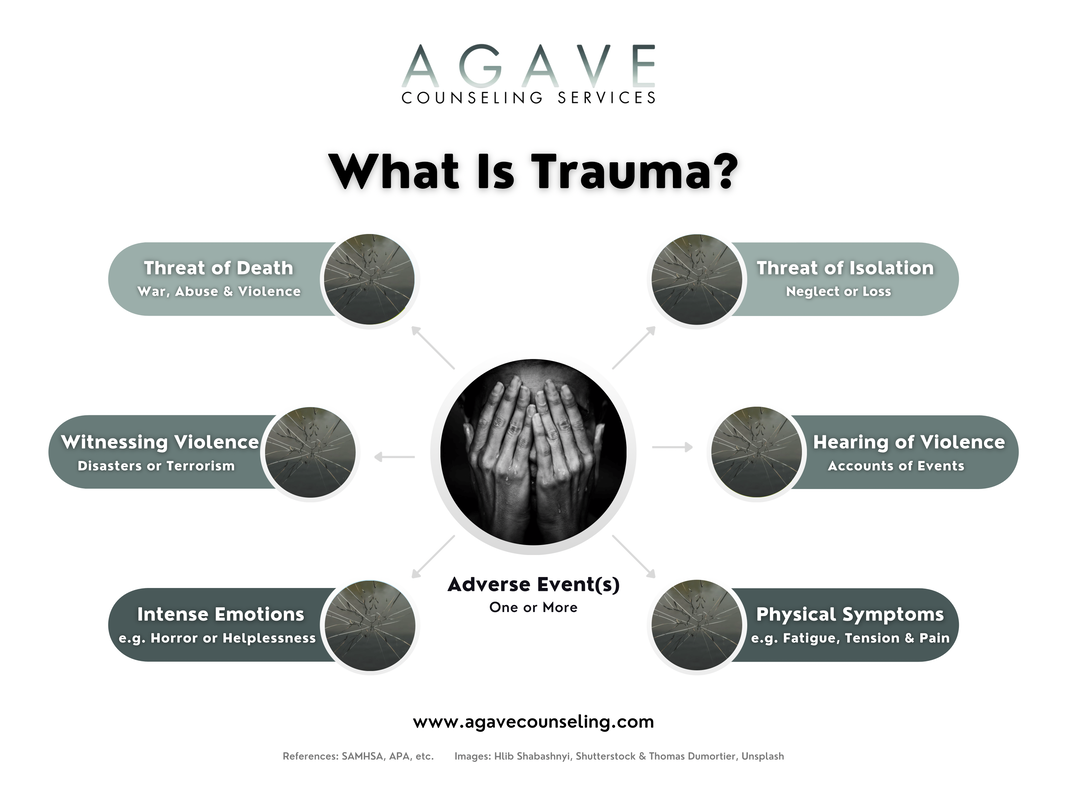|
Trauma Series - Part 1 of 7
Trauma can refer to any situation where a person experiences a significant amount of stress, fear, or danger, and feels that they are unable to cope with an event. Many people go through one or more experiences that they may consider to be distressing or traumatic events which can have an impact on their day-to-day functioning. Trauma can result in conscious and unconscious experiences that can plague our emotional, physical, and psychological well-being. Our understanding of trauma has expanded from the limited viewpoint that trauma can only be experienced by veterans and survivors of abuse, as well. It is also important to recognize that an event is subjectively deemed traumatic by the person experiencing the trauma, and should never be invalidated or attempted to be convinced otherwise.
Attending to trauma is crucial for mental health because traumatic experiences can have a profound impact on an individual's thoughts, emotions, and behaviors. Trauma can create persistent feelings of fear, anxiety, and depression, as well as negative beliefs about oneself and the world. These symptoms can lead to a range of mental health conditions, including post-traumatic stress disorder (PTSD), depression, and anxiety disorders. In some cases, trauma can also lead to physical health problems, such as chronic pain and autoimmune disorders. Furthermore, trauma is often interconnected with other social determinants of health, such as poverty, racism, and discrimination. Individuals who have experienced trauma may face additional barriers to accessing healthcare, education, and employment, which can further exacerbate mental health issues. Addressing trauma is therefore critical not only for individual mental health but also for social justice and equity. In recent years, there has been an increasing focus on trauma-informed care, which recognizes the impact of trauma and seeks to create safe, supportive environments for individuals who have experienced trauma. This approach emphasizes the importance of trust, safety, and empowerment in the healing process and promotes a collaborative, strengths-based approach to treatment. Trauma-informed care has been shown to be effective in reducing symptoms of trauma and improving mental health outcomes. In conclusion, the transformation of the word "trauma" to include adverse life experiences is an important development in our understanding of mental health. Addressing trauma is essential for promoting mental health and reducing health inequities. By recognizing the impact of trauma and promoting healing, we can work towards creating a more compassionate and resilient society. References 1. American Psychiatric Association. (2022). Diagnostic and statistical manual of mental disorders (5th ed., text rev.). https://doi.org/10.1176/appi.books.9780890425787 2. Bremner, J. D., & Marmar, C. R. (Eds.). (1998). Trauma, memory, and dissociation (pp. 242–250). American Psychiatric Press. 3. Der Kolk, B. V. (2015). The body keeps the score. Penguin Books. 4. Herman, J. L. (2015). Trauma and recovery: The aftermath of violence from domestic abuse to political terror. Basic Books. 5. Substance Abuse and Mental Health Services Administration. (2014). SAMHSA's Concept of Trauma and Guidance for a Trauma-Informed Approach. https://store.samhsa.gov/sites/default/files/d7/priv/sma14-4884.pdf 6. World Health Organization. (2013). Guidelines for the management of conditions specifically related to stress. Geneva: World Health Organization. https://apps.who.int/iris/bitstream/handle/10665/85119/9789241505406_eng.pdf
0 Comments
|
ExtrasFreebies & E-Courses ThemesRecent posts |


 RSS Feed
RSS Feed